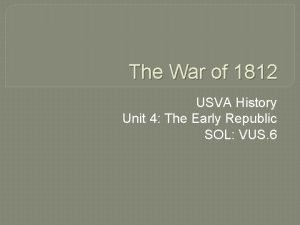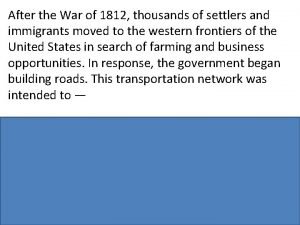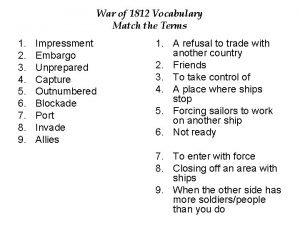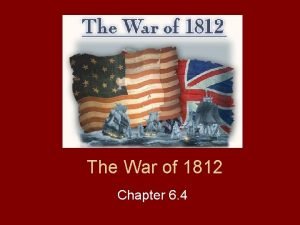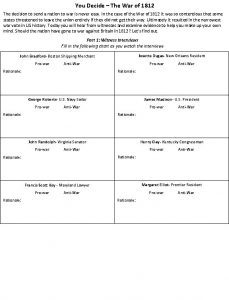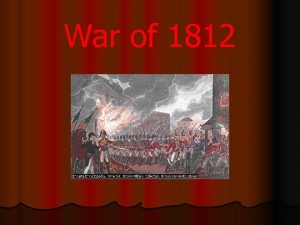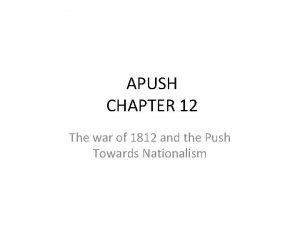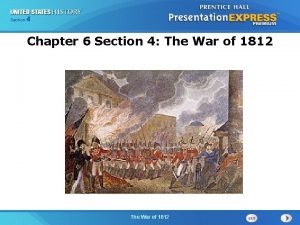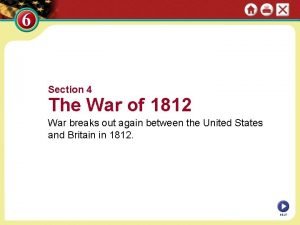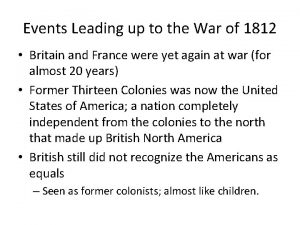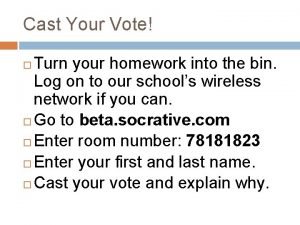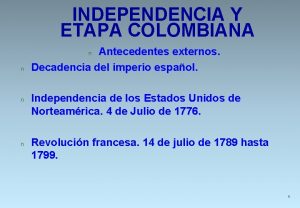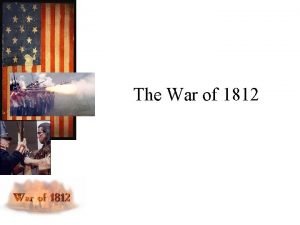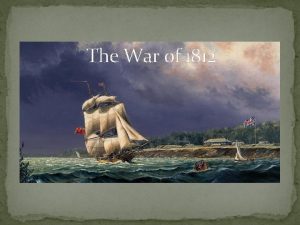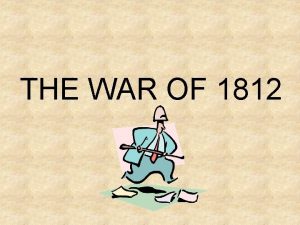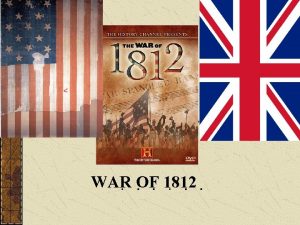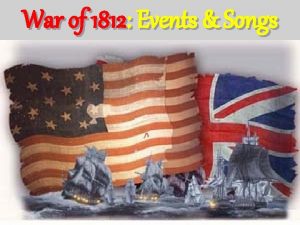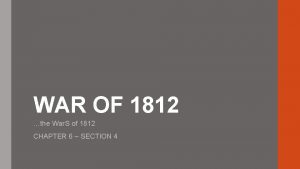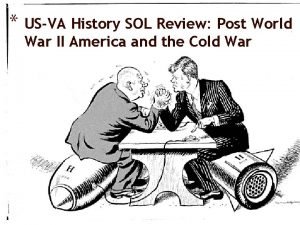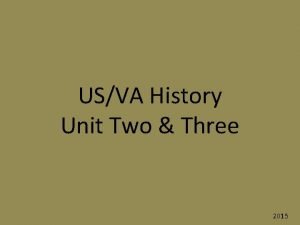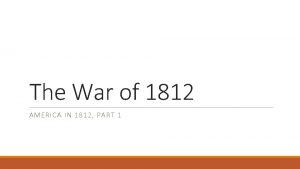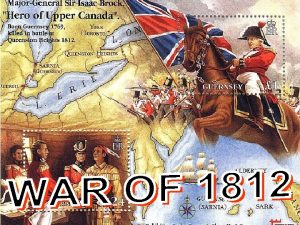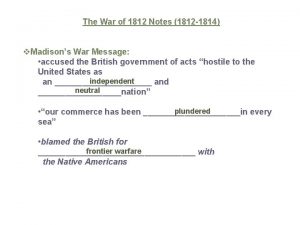The War of 1812 USVA History Unit 4














- Slides: 14

The War of 1812 USVA History Unit 4: The Early Republic SOL: VUS. 6

Background � Great Britain and France at war in 1803 � America proclaimed neutrality � The British and French both announce that they will confiscate any goods aboard ships coming to trade with their enemy. � What should the United States do?

British Navy: Not Very Impressive � The British Navy began stopping American trade ships and forcing the men to enlist. � This is known as impressment. � Tensions escalated further when a British ship opened fire on an American vessel killing 3 Americans for refusing to allow them to search their ship.

Embargo 1807 President Jefferson did not want to go to war. � Instead, he asked Congress to place an embargo which was a government ban on trading with European nations. � The embargo was repealed in 1809 after it began to hurt the economy in both the north (trade/manuf. ) and the south (agriculture). �

1808: A New President Our fourth President is elected: James Madison, also a Democratic. Republican � Madison wants to avoid war at all costs as well. � He passes the Non. Intercourse Act which banned trade with both Britain and France and would reopen trade with whichever country dropped its trade restrictions against the United States first. �

A Different Route: Macon’s Bill No. 2 In 1810, Congress replaces the Non. Intercourse Act with Macon’s Bill No. 2 which opened trade with both Britain and France and promised both that if they dropped their trade restrictions that we would stop trading with the other. � French leader, Napoleon, agrees and the United States stopped trading with Britain. �

Too Little, Too Late � The British economy was hurt by the Americans refusal to trade. � By 1812 the British attempted to drop trade restrictions but it was too late. � The United States had declared war on Great Britain.

Americans Declaring War � � � Influences… Impressment of sailors “War Hawks” • Congressmen from the South and Western regions pushing for war. • Southern planters hurt tremendously by the British stealing their cash crops sent to Europe. � Clashes with Native Americans in the west were blamed on the British for giving them guns and encouraging them to attack the Americans.

Americans Ill-prepared for War Heavy division among people either supporting the war or against it. � Army only had 7, 000 troops who were poorly equipped. � The national bank charter had run out and Dem. Republicans wouldn’t recharter it so the government couldn’t take out loans. � • Most banks were in the NE and they didn’t support the war.

Invading Canada The United States invades Canada unsuccessfully on three different occasions. � With the focus on Canada and the defeat of Napoleon’s French military the British focused on Washington, D. C. � They invaded D. C. and burned it to the ground and headed for Baltimore. �

The Star-Spangled Banner is Born The Americans were ready for the British when they arrived at Fort Mc. Henry in Baltimore. � The Americans successfully defended the fort and pushed back the British. � Francis Scott Key, an American prisoner aboard a British ship watching the battle wrote a poem which would later become our national anthem. �

A New Hero Emerges in New Orleans � The British were also defeated in New Orleans at the mouth of the Mississippi by General Andrew Jackson. � The war drew to a close with both sides agreeing to an armistice (ceasefire). � Neither side surrendered nor claimed victory.

The Treaty of Ghent � The war was ended with the Treaty of Ghent signed on December 24 th, 1814. � Prewar boundary lines were restored between the United States and British Canada. � They both did agree to claim the Oregon territory in the Northwest jointly.

Impacts of the War of 1812 � Increased prestige and respect for the United States military throughout the world � Renewed spirit of patriotism and nationalism in the country. � The Federalists party greatly weakened by their lack of support for the war.
 Usva history
Usva history War of 1812 dbq
War of 1812 dbq After the war of 1812 thousands of settlers
After the war of 1812 thousands of settlers War of 1812 vocabulary
War of 1812 vocabulary Chapter 6 section 4 the war of 1812
Chapter 6 section 4 the war of 1812 Why was josette dugas for the war of 1812
Why was josette dugas for the war of 1812 How did free seas and trade cause the war of 1812
How did free seas and trade cause the war of 1812 War of 1812 apush
War of 1812 apush Chapter 6 section 4 the war of 1812
Chapter 6 section 4 the war of 1812 Section 4 the war of 1812
Section 4 the war of 1812 Leading up to the war of 1812
Leading up to the war of 1812 Turn in your homework
Turn in your homework Snow white and the seven genders
Snow white and the seven genders Antecedentes externos de la independencia de colombia
Antecedentes externos de la independencia de colombia 1812 overture movements
1812 overture movements
